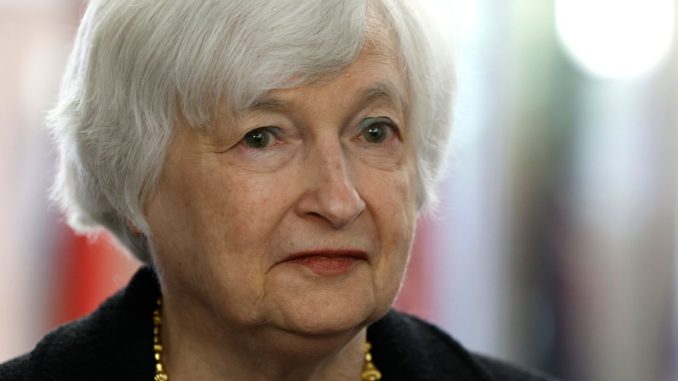
Treasury Secretary Janet Yellen warned congressional leaders Monday that the United States could be unable to pay its bills as soon as early June, a much faster timetable than many had previously thought.
The warning provided new urgency to ensuring that the Treasury Department can keep borrowing in order to pay the government’s bills, with President Joe Biden inviting House Speaker Kevin McCarthy to the White House next week.
“After reviewing recent federal tax receipts, our best estimate is that we will be unable to continue to satisfy all of the government’s obligations by early June, and potentially as early as June 1, if Congress does not raise or suspend the debt limit before that time,” Yellen said in a letter to congressional leaders of both parties.
Yellen had been expected to give Congress an updated timetable on the Treasury’s financing efforts, as it has been taking various accounting maneuvers since January to stay below the current $31.38 trillion.
But those “extraordinary measures” have been dwindling with time, and the new estimate surprised many observers who watch Treasury’s finances closely.
Personal income tax receipts, a big source of income for the government, have been down compared with last year but not so badly that they were expected to affect the Treasury’s ability to continue borrowing past a low-cash point in June.
Congressional Budget Office Agrees
Yellen hedged slightly in her letter, acknowledging the possibility that a June exhaustion date was premature.
“This estimate is based on currently available data, as federal receipts and outlays are inherently variable, and the actual date that Treasury exhausts extraordinary measures could be a number of weeks later than these estimates,” she said.
“This estimate is based on currently available data, as federal receipts and outlays are inherently variable, and the actual date that Treasury exhausts extraordinary measures could be a number of weeks later than these estimates.”
– Treasury Secretary Janet Yellen
The nonpartisan Congressional Budget Office, however, also warned that June was a danger point. In its forecast, the CBO said, “We now estimate that there is a significantly greater risk that the Treasury will run out of funds in early June.”
Previously, late July had been seen as the most likely window for Treasury to run out of borrowing room and be forced to choose between defaulting on its debt, which is a global benchmark in finance because of its indication of creditworthiness, or not paying ordinary bills when they come due.
No substantive negotiations on raising or again suspending the debt limit have taken place between the White House and House Republicans yet. The White House has said it will negotiate over budget issues but not the debt ceiling, which it has said should be raised unconditionally. House Republicans have said there should be spending cuts or other reforms in order to raise the debt limit.
“We now estimate that there is a significantly greater risk that the Treasury will run out of funds in early June.”
– Congressional Budget Office
“This afternoon, President Biden called Speaker McCarthy, who is leading a [congressional delegation] in Israel, to invite him to a meeting at the White House on May 9 with Leader Jeffries, Leader Schumer, and Leader McConnell, who the President also called today,” the White House said, referring to Democrats Hakeem Jeffries, the House minority leader, and Chuck Schumer, the Senate majority leader, and to Senate Republican Leader Mitch McConnell.
The House passed a $4.8 trillion spending cut bill last week as its opening bid, meeting a condition set by the White House to start negotiations. But the bill would get most of its savings from cuts to the pool of funding lawmakers dole out annually to federal agencies, including the Defense Department, the Health and Human Services Department and the Environmental Protection Agency. The depth of possible spending cuts led Democrats to declare the bill dead on arrival in the Democratic-led Senate.
Fresh Urgency
With the new due date, though, some hoped negotiations would get a needed kickstart.
“That provides a little more information for President Biden to get off the couch and call Speaker McCarthy and work something out,” said Sen. John Cornyn (R-Texas).
In its report, the CBO said receipts after April 18, the due date for individual income tax payments this year, had been off, which had been expected, but also that the Internal Revenue Service would be finished processing tax payments much faster than it had in prior years, which had seen slowdowns over the coronavirus pandemic.
“As a result, we anticipate that the IRS will process relatively few additional payments in May, as it did in the years before the pandemic. That, in combination with less-than-expected receipts through April, means that the Treasury’s extraordinary measures will be exhausted sooner than we previously projected,” the agency said.
It remains possible the Treasury Department is being cautious with the June date, given the consequences of default on either its securities or other debts. The picture may be clarified Wednesday when Treasury debt management officials hold their quarterly news conference.
“I still have them squeaking through, but even if that’s correct, I think Treasury is trying to turn up the heat on Congress, and we have to think about what that means,” said Nancy Vanden Houten, lead U.S. economist with advisory firm Oxford Economics.


Be the first to comment